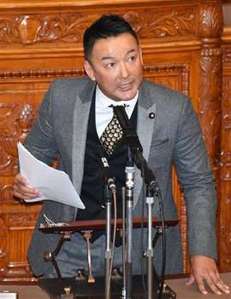 www.MSN.com
www.MSN.com While Yamamoto is currently a representative of the Liberal Party (together with party leader Ozawa Ichiro), he has formed numerous alliances over the past five years with the DPJ, Unity Party, New Socialist Party of Japan, and the Greens Japan, to name just a few. Yamamoto has primarily set himself against what he perceives to be the vested interests in Japan that ignore the general welfare of the people, particularly the right-wing, conservative agenda of the ruling LDP and Komeito parties. Yamamoto has voiced his opposition to the Abe government’s attempts at constitutional revision, its endorsement of the TPP, and its moves to restrict access to public information and strengthen national security laws. Furthermore, in 2013 Yamamoto made a name for himself by presenting a letter in person to Emperor Akihito at the Enyukai, an annual formal reception hosted by the Emperor, in which he advocated that Japan cease relying on nuclear energy by detailing the damage inflicted on Fukushima Prefecture and that under conservative governments the country was in danger of receding to a pre-war state of ignorance (an act for which he was reprimanded by the House of Councilors).
Yamamoto is unapologetic about his anti-conservative (or more correctly, anti-right wing) stance, going so far as to ridicule PM Shinzo Abe’s wife Akie Abe’s involvement in the Moritomo Gakuen scandal by referring to it as the “Ak-heed Scandal”, a reference to the Lockheed scandal of the mid 1970s that brought down then sitting PM Tanaka Kakuei (which elicited a sharp rebuke from PM Abe). He has previously criticized NHK for being far too lenient towards the LDP in its questioning of the Kakei and Moritomo scandals (and called for viewers to boycott paying compulsory subscription fees to the national broadcaster), and has also criticized the continuation of whaling, the forced removal of homeless from Olympic venue sites, the Abe government’s decision not to enact (i.e., bring into force) the Paris Climate Agreement, and is against PM Abe or members of his government paying visits to Yasukuni Shrine.
Yamamoto’s role seems to be one of, to use an Australian vernacular expression, “keeping the bastards honest”, pursuing the government on issues of social inclusion and the role of the state as well as reminding the government of its responsibility to its citizenry. This has made him a favourite target for right wing pundits and nationalist commentators, but it hasn’t dampened his enthusiasm for tackling subjects that might otherwise never see the light of day, and Japan politics is all the better for it.
 RSS Feed
RSS Feed